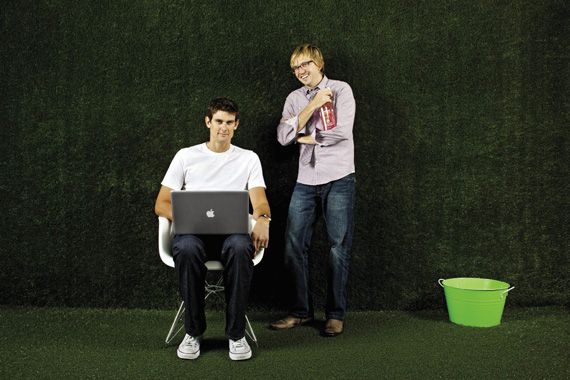Step into the Method offices during a busy day, and you’ll see the household cleaner company’s founders, ad man Eric Ryan and climate scientist Adam Lowry, jamming on the guitar with 70 employees. Or they might be in raccoon outfits shaking hands with Target execs or playing broomball with retailers. “We compete on creativity,” says Ryan. “So if you create an environment where people aren’t afraid to dance in costumes, it’s an open, collaborative workplace where you can share ideas without embarrassment.”
Which is why they’ve made work and play go hand-in-hand, starting when the childhood friends ran into each other on a plane in 1998 and moved in as roommates in San Francisco to launch a startup. Many costume parties later and the idea behind Method was born. By 2001, their biodegradable soaps, detergents, and cleaners hit the shelves, eventually making the FiDi startup one of the fastest-growing eco-soap makers in the country. “So much of the company’s personality and philosophy is shaped by San Francisco’s optimism, sustainability, and creativity,” says Ryan, who today lives with his wife and three kids in Larkspur (Lowry is in Ashbury Heights with his wife and daughter). “It’s been through booms and busts many times. San Francisco is our muse.”
Last month, Ryan and Lowry published their story (and office antics) in their book, The Method Method. In it, they discuss their trials, errors, and business strategies and values—among them, kick ass fast, be weird, and have fun in the office (as illustrated by photos from their annual prom tacked to office walls and the piñatas hanging from the ceiling). “We believe people don’t perform at their highest levels unless they are having fun doing it,” write Ryan and Lowry. “If you can’t be yourself at work, you’re not going to do good work.” It all smacks of a tech startup, where professional and personal lives blur, employees eat catered meals together, and receptionists hand out Jägermeister shots on Jersey Shore day.
Or maybe fun is just something you naturally value when you build a company with an old high-school buddy. “Learning how to work together with a friend is like a marriage,” Lowry says. “We have nonverbal communication. We can also finish each other’s sentences.”
Related Articles
